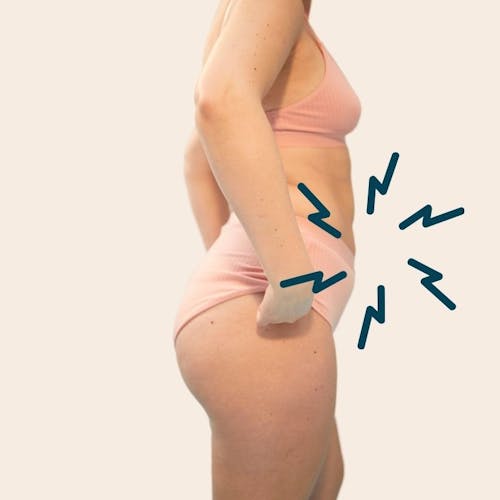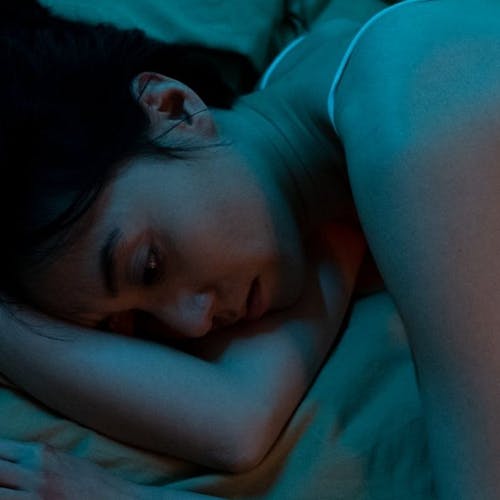This website uses cookies to enhance the user experience. By using Yoppie you are agreeing to our use of cookies.
Endo Feels: Weight Gain, Painful Sex, And Other Side Effects Nobody Likes To Talk About
Written by Yoppie
01 Mar 2021
Back and leg pain
Weight gain
Painful sex
Painful bowel movements
Fatigue
We’ve gone into detail about endometriosis on the blog before, and its many not-so-fun symptoms (we see you painful cramps, heavy bleeding and excessive bloating!). Endo is commonly considered to be just bad period pain, but those who suffer will know it’s so much more than that, and there are a few lesser-known symptoms that you may not have heard of (because nobody likes to talk about them).
Let’s take a look at 5 symptoms you may not have considered:
Back and leg pain
If you think you’re going crazy when you feel your endometriosis hurting your back and legs… you’re not. Backache and leg pain is actually pretty common among sufferers, and when you think about how close some of the muscles that support your back and pelvis sit to the uterus, it started to make sense.
Endometriosis means that tissue (not dissimilar to the kind that grows in your uterus) starts to show up in unwanted places, like the ovaries and fallopian tubes. It acts much like uterine tissue, so it swells and can release blood during your period, which can irritate nerves that connect to your pelvis and legs, such as the sciatic nerve. This can leave you with a throbbing or stabbing sensation in your legs or lower back which can range from being a bit of a nuisance to very debilitating!
Other things to consider are that if your abdominal pain is bad enough to have you hunching over, this can affect your back, too. Plus, it is a well known fact that back and leg pain could be related to weight gain, which leads us to our next symptom...
Weight gain
This is one of those tricky symptoms that no one is able to pinpoint to a specific health concern, and doctors differ in their opinions on whether endo can cause weight gain. Traditionally endometriosis is linked to women with a lower body mass index. However there is plenty of anecdotal evidence to suggest that endometriosis may also lead to an individual gaining weight over time.
Endometriosis treatment may involve certain medications like the contraceptive pill, and in extreme cases, a hysterectomy to manage the pain, all of which can result in weight gain.
Sticking with hormone imbalances, we know that endometriosis is linked to high estrogen levels, which is the hormone responsible for the thickening of the endometrium during your menstrual cycle. Too much estrogen can lead to symptoms like bloating, irregular periods, breast tenderness, and… whaddaya know… weight gain.
Painful sex
Ah yes, the sexy-time-ouchies. With endometriosis, it’s not uncommon to experience pain during sex, or even a few days afterwards. This happens because penetration and other body movements can stretch and pull at the deposits of endometriosis, causing anything from mild to severe pain. Some say it feels like an ache in the pelvic area, while others say a sharp or stabbing sensation. Either way, it’s not pleasant!
Don’t feel like this is something you need to grin and bear. Sex is supposed to be enjoyable, so speak to your partner about the pain, try timing it around certain points in your menstrual cycle, and experiment with other ways to be intimate without causing pain.
Painful bowel movements
One of the places that endometrial tissue tends to spread to easily is the bowel, and this is referred to as bowel endometriosis; when the tissue grows in or around your intestines. Up to a third of endometriosis sufferers have endometrial tissue on their bowel, which can result in straining and pain when having a bowel movement, as well as diarrhea, constipation, and even rectal bleeding (which should of course be checked out by your GP).
It’s common for people with gastrointestinal symptoms to be misdiagnosed with something like inflammatory bowel disease, when in fact the root cause is endometriosis. Symptoms are usually very similar, so it’s difficult to catch. The key is to figure out how symptoms change alongside your menstrual cycle, as this could be the biggest indicator of endometriosis. Keeping a diary of your symptoms and your menstrual cycle could help you figure out the problem faster.
Fun fact: The area between your cervix and rectum can be affected by endometriosis too. It’s called the recto-uterine pouch, otherwise known as the Pouch of Douglas. And the funniest name award goes to!
Fatigue
If you suffer from endo and struggle to make it through a day at work, you’re not alone. Besides the pain and other strange symptoms, there’s also an element of fatigue that comes with this condition. For some, they get a bit tired. For others, it’s almost debilitating, and has even been associated with personality changes.
Recent studies have shown that fatigue is a common symptom of endometriosis, and can be a result of others, such as endometriosis pain, anxiety, stress, and irregular bleeding. In one study of 22 participants, all 22 reported fatigue related to their endometriosis, with varying degrees of intensity. 21 out of 22 participants said it was at least “somewhat bothersome”, and most said it impacted their day-to-day social and physical activities, mood and emotions, relationships with family or their partner, and work or school.
Do you experience any of the endo symptoms above? What about these surprising ones from sufferers on Endometriosis.net? Remember you can (and should) visit your GP if it’s affecting your daily life. Your doctor will be able to do the necessary tests, recommend treatment options, and get you feeling great again.
Tell us about your personal experience of endometriosis, or ask us about your symptoms, in our private Facebook group or on Insta @itsyoppie. Don't forget that our personalised period subscription box can get endometriosis supplements, organic tampons (and much more) delivered easily and regularly through your letterbox, fully tailored to your personal menstrual care needs.
Fact checked by Doctor Brooke Vandermolen.
More References
Saar TD, Pacquée S, Conrad DH, et al. Endometriosis Involving the Sciatic Nerve: A Case Report of Isolated Endometriosis of the Sciatic Nerve and Review of the Literature. Gynecol Minim invasive Ther 2018; 7: 81–85.
Farland L V, Missmer SA, Bijon A, et al. Associations among body size across the life course, adult height and endometriosis. Hum Reprod 2017; 32: 1732–1742.
Wolthuis AM, Meuleman C, Tomassetti C, et al. Bowel endometriosis: colorectal surgeon’s perspective in a multidisciplinary surgical team. World J Gastroenterol 2014; 20: 15616–15623.
DiBenedetti D, Soliman AM, Gupta C, et al. Patients’ perspectives of endometriosis-related fatigue: qualitative interviews. J patient-reported outcomes 2020; 4: 33.
Section jump
Back to top
Subscribe To Our Newsletter
YOPPIE





© 2024 Yoppie is a registered trademark of Phlo Technologies Ltd.
Yoppie's supplements are not a substitute for a varied diet and healthy lifestyle and are not intended to diagnose, treat, or cure any disease. If you are pregnant, breastfeeding, have a medical condition or are under medical supervision, please consult with your doctor before taking any of our products.







